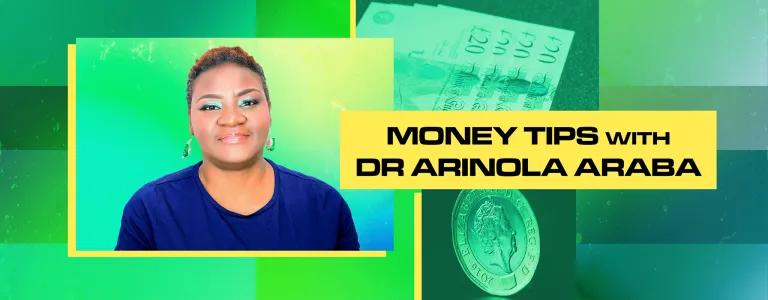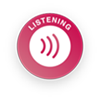
Money Tips For Teens
Include this article in your Skills Builder Journal. It could help you develop... 

How much do you know about money? Are you a saving superstar? Or do you find that your pounds seem to run out quicker than a cup of tea? Whatever your financial situation right now, Dr Arinola Araba - a leading financial expert and founder of bMoneywize - is here with some tips and tricks to stay money smart:
Student finance website, Save the Student, published that three-quarters of students said they did not get enough financial education in school, hence the need to have this conversation now.
I was shocked when I started reading about money tips. One book said:
- Don’t shop when you’re hungry
- Stick to your shopping list
- Don’t be tempted to buy, even if they tell you the sales will end today, just walk away
I struggled with that concept of letting sales go! But I learnt that if you look after the pennies, the pounds will take care of themselves.
I later understood the psychology of sales and marketing, and their use of persuasive words like, “you know you want to...” “you deserve it!” “you are worth it” and many others which encourage us to part with money, without thinking.
The lesson here is if you do not have a plan, it’s easy to fall for someone else’s. That’s why preparing for the future and starting a budget is so important. I’ve come up with a simple acronym - TEENS - to help you get better with your finances.
THINK
Start thinking about the future and your long term money goals. What kind of life would you like to live? When would you like to retire? Do you want a healthy pension? Do you want to buy a house? It might seem far off, but now is the time to start planning for these goals. If you started saving now, by the time you are in your 40’s, you will have saved a lot of money, especially if you took advantage of compound interest - this is when interest is paid on interest earned.
Government schemes like Help to Buy and Lifetime ISAs also encourage young people to save up for a house. These allow you to save money, and get money from the government at the same time, which could give you enough to put down a 20-30% mortgage on your first home!
EDUCATE
Educate yourself in money matters. The London Institute of Banking and Finance surveyed young people and discovered that 7 in 10 students regularly worry about money and 8 in 10 want to learn more about it during school.
When you start work, you’ll need to know how much tax you will be expected to pay or how tax bands work. Your wage or payslip will also display your taxable earnings. Your Personal Allowance is the first £12,500 of your earnings that is exempt from tax.
If you need them, use credit and debit cards wisely. A credit card gives you access to money you owe and pay a fee to use, while a debit card is for money you already own. If the former goes unpaid, it could land you in a lot of debt and compound interest could make it spiral out of control. Your dealings with money are also recorded on your credit report and you’ll want to keep it squeaky clean to avoid problems with credit in the future.
We’ve got a lot of videos on this on our bMoneywise YouTube channel.
EXCHANGE
Now is the time to trade - or exchange - what you don’t need for what you want. Do you want to buy something special? Trade some of the time on social media for learning about money. Trade some unwanted items for money on eBay or Amazon.
My father was a medical doctor back in Africa. He also ran a small medical practice and I remember him saying how glad he was that he discovered investing. He would ask me to buy the Financial Times and talked about investing in shares. What are shares? Little pieces of a company that the public can buy and own. So find out about how you also can start owning shares! It paid him huge dividends, and I started to do the same too.
NEEDS
If you have to spend, decide whether it’s for a need or a want. Practise delaying a spend and save for what you need. It can even be fun to plan how to get money for something you want - maybe you could do more chores around the house, mow some lawns for your neighbours, sell art-work or redesign your old T-shirts, jeans etc, and sell them online.
Have you heard of the 50/30/20 rule? It’s a budgeting principle, where you spend 50% of your money on your needs, 30% on your wants, and 20% on savings and investments. Why not give this a go - it’s also a great way to show off your spreadsheet skills!
SAVE
Saving regularly will help build a lump sum to secure your future. An investor is someone who makes money from their money. That person could be you if you start learning and exploring different ways to make your money work for you.
Did you know you could get a basic bank account from the age of 11? Bank apps like Monzo or MoneyBox are also really helpful in managing, budgeting and investing your money. It’s also worth checking out ISAs, Junior ISAs, AER and APR to understand how to save your money in the best way for your future.
It’s also good to start making a habit of reviewing your spending regularly and cancelling services you no longer use or need - do you pay for Netflix but actually don’t really use it? I asked my daughter if she would consider switching her credit reporting account from Experian (costing £15/month) to Clearscore (Free app), and putting the money towards her pension.
Simple changes like these can help in the long run when it comes to being financially smart and stable. Good luck!




